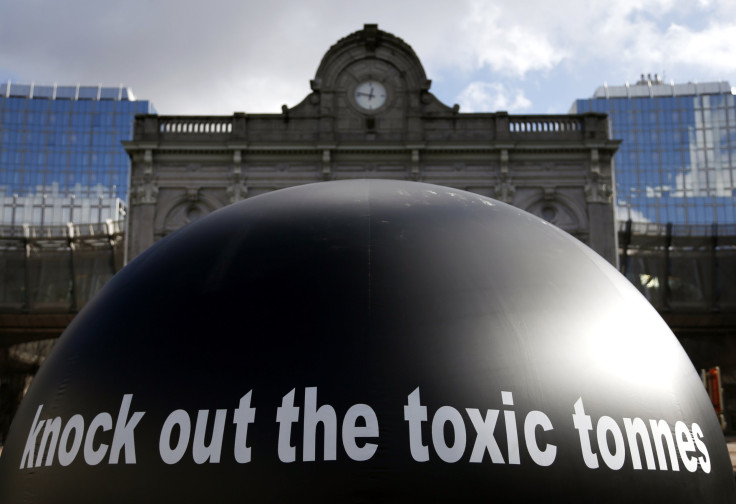Big Businesses Seeking CO2 Emissions Price See Ray Of Hope In Paris Agreement

PARIS (Reuters) -- For the most part, big businesses wanted one thing from the climate accord in Paris Saturday: a price on carbon dioxide (CO2) emissions. While on the surface their hopes were dashed, a look deeper may give them cause for optimism.
Multinational companies from oil giant BP to consumer-products maker Unilever have called for a globally agreed way of pricing emissions of CO2 -- the gas most widely blamed for global warming -- to create an incentive for power plants and factories to shift to cleaner forms of energy. That is opposed by big oil-exporting countries, such as Saudi Arabia, as well as other nations, such as Bolivia, reluctant to embrace any market-based solutions.
But Saturday's landmark agreement in Paris included an inelegant reference to what some analysts think could eventually build a bridge to a global CO2-emissions trading mechanism.
The binding part of the deal, for the nearly 200 nations that agreed to it, allows countries to use "internationally transferred mitigation outcomes," which could allow nations on a voluntary basis to offset their own CO2 emissions by buying credits from other nations.
At some point, analysts said, that might lead to a tie-up between the European Union's Emissions Trading System (ETS), which is for now the world's biggest market for CO2-emissions permits, and China's planned trading scheme set to be launched in 2017, which will overtake it in size.
The reference is "critical in the context of the potential establishment of a crediting mechanism and to some degree to facilitate future potential emissions trading systems linkages," said Yann Andreassen, senior analyst at ICIS Tschach Solutions.
It is unlikely to happen as fast as some business sectors say they want.
But shortly after the deal, French President Francois Hollande said he would seek to build a coalition of countries that wanted to pursue a CO2-emissions price.
The Paris Agreement's only direct reference to "carbon pricing" occurred in a nonbinding, political section of the text, where the countries "recognize the important role of providing incentives for emission-reduction activities, including tools such as domestic policies and carbon pricing."
Stronger language in the internationally agreed pact would have destroyed a fragile consensus, delegates said.
Catherine McKenna, Canada's environment minister, said in Paris some countries were opposed to any role for markets in countering climate change. "Many countries recognize that markets have a role to play and whether or not the language is reflected in the agreement, there will continue to be a role for the markets," she added.
Jeff Swartz, policy director at the International Emissions Trading Association (IETA), said that showed CO2-emissions pricing would increase regardless of the final Paris deal. "I think we are going to see a multitude of approaches to CO2 pricing. Some of this will happen at this process, and some will happen outside," he said.
In the immediate term, however, the EU's ETS -- where CO2-emissions permits are languishing at around 8.50 euros ($9.34) per tonne -- is not expected react strongly Monday morning, traders said.
© Copyright Thomson Reuters 2024. All rights reserved.




















